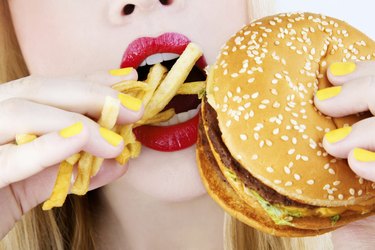
At one time or another you probably ate way more than you intended to eat. One day of binge eating may add a pound or two, but it's temporary water weight, not fat. Continuously eating more calories than your body needs -- day after day -- is what causes fat gain. Consult with your doctor if you think your binge eating is out of control and is affecting your weight.
Excess Calories Over Time Lead to Fat Gain
Video of the Day
You gain fat when you're consistently eating more calories than your body needs. Because 1 pound of fat contains 3,500 calories, if you eat an extra 500 calories every day for seven days, then you might be a pound heavier at the end of the week. However, it takes several weeks to gain a significant amount of fat weight, according to registered dietitian Monica Reinagel. Therefore, one binge isn't likely to cause you to get fat.
Video of the Day
Temporary Weight Gain After a One-Day Binge
If you weigh yourself regularly, and find that the number on the scale has increased after your one-day indulgence, there's no need to get upset. Your weight fluctuates throughout the day, and that extra weight may be due to a number of things that don't involve fat. A few of those extra pounds may be the meal itself, and it can take several hours for your body to digest the food and for your weight to go back to normal.
Some of that excess weight may also be fluid, especially if what you ate was high in salt. Sodium causes your body to retain fluids, which can increase the number on the scale.
Tips to Prevent Binges
While it's OK to overindulge on occasion, there are steps you can take to prevent binges. First, don't go hungry. You may be tempted to save your calories if you're going to a special event or having dinner at a buffet restaurant, but not eating all day may leave you so hungry that you're ravenous and gobble up more than you planned to eat. To control hunger throughout the day without overdoing it on calories, eat small meals of high-fiber, low-cal foods such as fruits and veggies. Eat slowly, savoring every bite, and wait at least 10 minutes before going back for seconds. Also, be sure to drink plenty of water.
Sometimes people binge due to stress or negative emotions. If you struggle with this, try managing stress with meditation or exercise instead of turning to food. If a craving hits, use self-distraction -- such as talking to a friend or working on a project -- to help prevent a binge. Getting enough sleep at night, about eight hours, also helps keep your appetite in check and helps control cravings.
When Binging Is a Concern
If you're binge-eating regularly and feel like you can't stop, you may have a more serious issue that goes beyond the one-day binge. Binge eating disorder, or BED, occurs when a person engages in food binges frequently and feels emotional distress about it at the time or afterward. BED is not to be confused with bulimia, in which vomiting follows the binge, or the case of a person who starves herself or exercises heavily to make up for the binge. Because the calories from the binge foods are absorbed, weight gain is a common side effect of binge eating disorder. Professional help from a doctor and counselor is recommended to help manage the eating disorder.
- FamilyDoctor.org: What It Takes to Lose Weight
- National Heart, Lung and Blood Institute: Energy Balance and Obesity, Healthy Weight Basics
- Nestle: Does Your Weight Change From One Day to Another?
- Helpguide.org: Binge Eating Disorder
- QuickandDirtyTips.com: Nutrition Diva: How Long Does It Take for Food to Turn to Body Fat?
- Academy of Nutrition and Dietetics: How to Enjoy the Holiday Without the Weight Gain
Is this an emergency? If you are experiencing serious medical symptoms, please see the National Library of Medicine’s list of signs you need emergency medical attention or call 911.